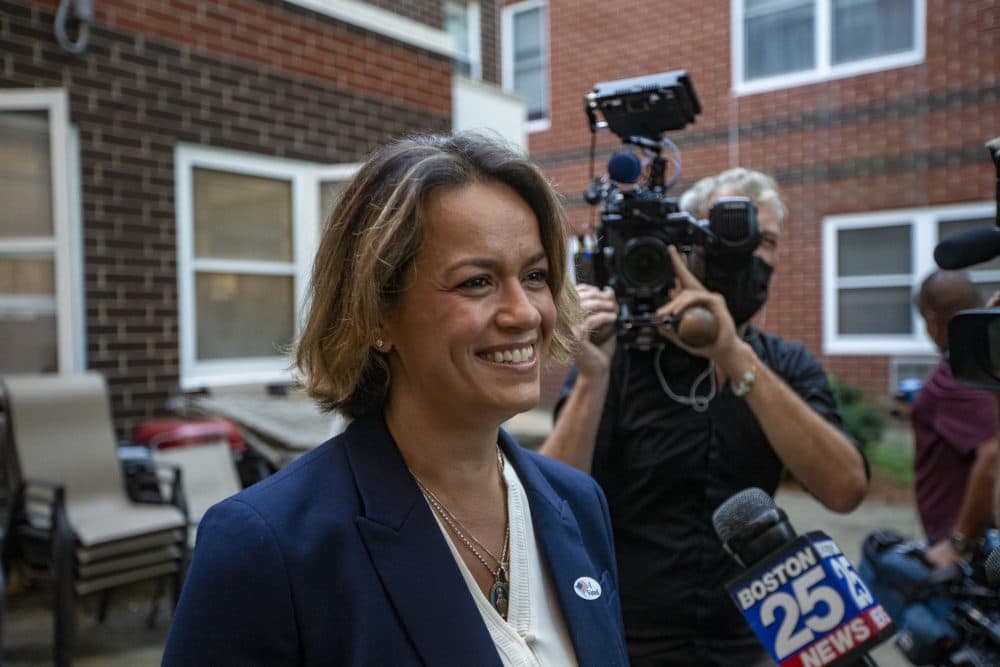Advertisement
Boston Mayoral Candidate Essaibi George Asks Super PACs To Stay Out Of The Race

City Councillor At-Large Annissa Essaibi George is asking super PACs — outside entities funded by unions and deep-pocketed donors who spent millions of dollars in the mayoral preliminary — to stay out of the final election between her and City Councillor At-Large Michelle Wu. She described herself as angry at their involvement and said they should not play a role in any election.
“I want them out of my race," she said.
Essaibi George, like Wu, has two super PACs supporting her campaign. One is led by former Boston police commissioner William Gross and has taken in $495,000 from New Balance chairman Jim Davis, who has also donated to former President Donald Trump and former mayor Marty Walsh. General contractors and police unions have also donated money to the Gross super PAC.
“I want to be clear to the people of Boston: I speak for myself,” Essaibi George said in an interview with the Reporter. “I speak for myself, for my work, for my campaign and I would like [super PACs] to very much stay out of this race.”
The Gross-led super PAC, which has called itself “Real Progress Boston,” drew fire in the preliminary for its links to a Beverly-based company, Red Curve Solutions, which worked for Donald Trump’s 2016 campaign. The super PAC aired TV and radio ads starring Gross, who endorsed Essaibi George earlier this year.
“This isn’t about Jim Davis,” Essaibi George said Tuesday. “This is about the very direct relationship between this super PAC and Donald Trump.”
Essaibi George, who joined the City Council in 2016, noted that she was the first elected official to endorse Ayanna Pressley’s in her bid to unseat Congressman Michael Capuano. She also worked for President Joe Biden’s campaign, making calls to voters in Georgia, Florida, and Arizona, as well as in her home state of Massachusetts.
“As someone who has been a lifelong Democrat, unwavering and firm in my Democratic principles, I am not fond of the relationship they have with Donald Trump,” said Essaibi George, who criticized the outside group after its first TV ad aired.
“I don’t want this PAC thinking they can speak for me or my campaign or my work,” she said.
The second Essaibi George super PAC, “Bostonians for Real Progress,” has largely focused on digital advertising and drawn donations from the owner of a towing and auto repair business in Hyde Park and a Wellesley financial analyst, among others.
Advertisement
Super PACs can raise and spend unlimited amounts of money, but they are prohibited from coordinating with the campaigns they support. That means candidates can call for super PACs to stand down, but it’s ultimately up to the outside groups if they want to heed the call.
In 2013, City Councillor John Connolly publicly asked outside groups to steer clear of the preliminary, but as super PACs supporting his rival, Marty Walsh, spent millions on TV ads and mailers, the pro-Connolly super PAC disregarded Connolly’s request and started pouring money into the final election.
The two Essaibi George super PACs did not immediately respond to a request for comment.
Wu’s super PACs are mostly fueled by environmental advocacy groups, such as the League of Conservation Voters. Jay Cashman, the construction and real estate magnate, and Paul Egerman, a longtime Democratic donor who served as treasurer during US Sen. Elizabeth Warren’s 2020 presidential campaign, have also donated to the “Boston Turnout Project,” which is chaired by a former Warren aide. The other Wu super PAC is tied to the Environmental League of Massachusetts.
The “Boston Turnout Project,” chaired by former Warren aide Jason Burrell, on Tuesday posted its second ad to YouTube. Called “History,” the ad includes a photo of Sen. Warren, who endorsed Wu in January, and touts Wu’s support for fare-free public transit.
Before Boston elections officials tallied all the votes in this month’s preliminary, super PACs had already shoveled more than $3 million into the mayor’s race. Much of the money went toward television ads and mailers targeting voters.
Each of the five mayoral candidates had at least one super PAC, which are typically funded by either unions or wealthy donors.
The super PACs offered varying levels of support for their respective candidates in the preliminary. A super PAC formed to support former city economic development official John Barros, but didn’t end up taking action. In Acting Mayor Kim Janey’s case, a super PAC backed by the hotel workers union UNITE HERE Local 26 aired a TV ad and helped canvass neighborhoods, while also targeting City Councillor Andrea Campbell through a negative radio ad.
Campbell had her own super PAC, “Better Boston,” which spent $2.8 million in the race. Major donors include the late Nonnie Burnes, a former state judge who served as Gov. Deval Patrick’s insurance commissioner, Netflix co-founder Reed Hastings, and donors with ties to charter schools.
It’s unclear whether the hotel workers super PAC and “Better Boston,” among the others that were involved in the preliminary, will play a role in the final phase of the mayoral campaign.
This story was originally published by the Dorchester Reporter. WBUR and the Reporter have a partnership in which the news organizations share stories and resources to collaborate on stories.